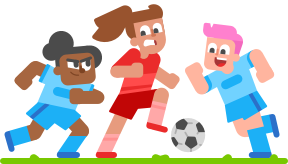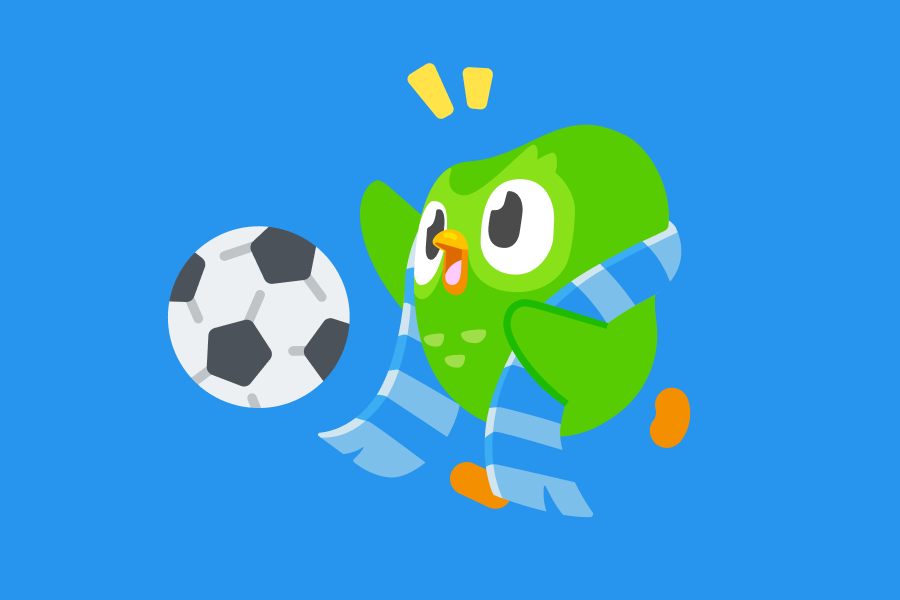Did you know that some of the world’s best soccer players aren’t just amazing athletes but also successful language learners? Find out their stories here!

Player polyglots
Multilingualism is common around the world, and there are many soccer players who grew up in bilingual families and communities—and then learned more languages with their teams. Here are a few exceptional multilingual soccer players:
- Belgian player Romelu Lukaku is famous for speaking eight different languages! He grew up using Flemish Dutch and French, and also learned the Bantu language Lingala. He's also learned the languages of places he’s lived during his soccer career, including English and Italian. Lukaku—Belgium’s all-time top scorer—revealed in an interview that learning a team’s language helps him play his best soccer. With that type of motivation, it’s no wonder he started communicating in Italian within a couple months of moving there this season!
- Christiane Endler, regarded the world’s best female goalie, is Chilean-German and lived in both England and the USA before moving to France to play for PSG (Paris Saint-Germain) and now Olympique Lyonnais. She's currently learning French to add to her hat trick of German, Spanish, and English!
- Barbra Banda speaks Nyanja and English, two of the many languages spoken in Zambia. She amazed audiences by becoming the first-ever player of any gender to score back-to-back hat tricks at the Olympics in Tokyo last year—and her language accolades include learning Spanish while playing for Logroño in Spain. She’s probably learning Mandarin Chinese now that she’s playing for Shanghai Shengli!
Athlete accents
Our languages tell part of our personal story, and so do our accents and dialects! How we use our languages and dialects expresses different aspects of our identity. Here are two soccer stars whose accents tell their story:
- Vivianne Miedema, the Netherlands’ record goal scorer of any gender, famously speaks English with a Scottish accent, as well as with some traces of her native Dutch accent. Her accent makes sense with her life story so far: She grew up in the Netherlands and was previously in a long-term relationship with a former teammate from Scotland. We'll be listening for whether she picks up a northern England accent from her current partner Beth Mead! Learners naturally acquire the words, accents, and grammar they interact with the most!
- Known for his fashion sense and his passion for environmental activism, Spanish defender Héctor Bellerín moved to London at 16 years of age to train with Arsenal’s academy. He now speaks Cockney English, which has caught soccer pundits off guard. Interestingly, when Bellerín moved back to Spain to play for Real Betis, the reverse happened, with some Spanish fans being surprised that he could speak his native (!) Spanish, after years watching him do interviews in English. Not only does the language we use help us express our identity, it impacts people’s perceptions of us!

Star students
- Kylian Mbappé is one of the world’s best male soccer players—he recently scored the goals that made France the first country to qualify for the 2022 World Cup round of 16! And he’s an avid language learner, too. Growing up in Paris, his first language was French, and he started learning Spanish at a young age, partially inspired by his childhood favorite club, Real Madrid. More recently, he has stated in an interview that he wants to learn six languages! Mbappé knows that using the language as often as you can is essential for learning. He seeks out opportunities to speak Spanish with Spanish-speaking teammates, journalists, fans, and even Colombian reggaetón singer J Balvin. Mbappé has embraced the attitude that practice makes perfect, and isn’t afraid to speak and make mistakes—after all, that’s how you learn.
- Did you know that you might get to compete with a professional soccer player in Duolingo’s weekly leagues? San Jose Earthquakes player Tommy Thompson started learning Spanish on Duolingo over three years ago. At first, his goal “was to be a bridge in the locker room, where the primary language was Spanish.” Thompson knows that consistency is key in learning a new language and likes to use Duolingo for 15-20 minutes per day. In addition, he practices Spanish with his teammates during training and in the locker room. Thompson calls speaking Spanish one of his “proudest achievements” and says “it’s a special feeling to be able to communicate with someone in their own, native language.” 💚 We couldn’t have said it better ourselves!
These seven players are just a few of the famous polyglot soccer players representing the sport around the world! This highlights something we at Duolingo love about soccer: It’s a multicultural, multilingual sport. Are you ready to learn your favorite player's or team’s language so that you can cheer them on? Who knows, it might help you land a selfie if they hear you! 😉
